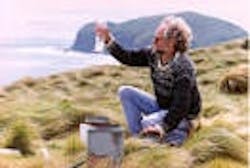Calif. Water Board Recruits Citizens to Help with Runoff Monitoring
The California State Regional Water Quality Control Board is recruiting volunteers willing to help collect, test, or compile spreadsheets on water runoff samples, reported Glenda Anderson in yesterday's Ukiah Daily Journal newspaper.
"It's very important to get the first rain," Revital Katznelson, the regional coordinator and technical adviser for the program, told Anderson. "We're hoping to have everybody ready to pounce when the first storm comes in."
The samples will be tested for anything that could potentially pollute the nearby Russian River. The information will then get entered into a database that used by the agency to prioritize its activities and management practices, Katznelson said.
She explained that area citizens are being recruited because the various agencies, including Water Quality and Fish and Game, simply do not have the necessary manpower.
"There's no way the regional board and other agencies can achieve monitoring without the help of the citizens," Katznelson said.
She said the water agency also needs help from people who aren't thrilled about the idea of trekking about in the rain; it also needs assistance with testing the collected runoff. People with computer skills, particularly those adept at Excel spreadsheets, also are welcome, she added.
Program coordinators will teach volunteers how to collect the runoff and provide them with equipment, Katznelson said. The first such training will be held Sept. 27 in Santa Rosa, she said.
Katznelson is reluctant to automatically label as pollution the substances found in runoff. The legal definition of pollution, she said, requires that it be known to cause harm.
The substances, however, are potential pollutants which can cause various kinds of harm. Plant nutrients, like nitrogen and ammonia, for example, promote algae growth, causing murky water and sucking up oxygen – which could result in fish kills.
While some people look for a particular cause of pollution, Katznelson asserted that everyone is responsible to a certain extent.
"It's coming from the things we do every day, each and every one of us. Every time we drive our car we put five different types of pollution into the air, even if we do something as noble as driving grandma to the doctor," she told Anderson.
The program is a partnership that includes the city of Santa Rosa, the water board, the Clean Water Team – the citizen monitoring program of the water board – the U.S. Environmental Protection Agency and the University of California Cooperative Extension.
Last year, volunteers collected more than 80 samples during the first rain. Tests indicated elevated levels of plant nutrients and diazinon – a widely used insecticide – was detected in many samples at levels that could harm aquatic life. Levels of E-coli bacteria also were high, according to water board staff.
Source: The Ukiah Daily Journal
